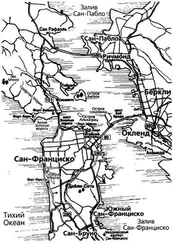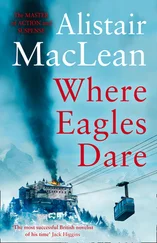‘I have a good right arm. Horses, no. Baseball, yes.’ Schaffer took aim and lobbed the explosive neatly through the doorway of the disappearing cable-car. ‘Like that?’
‘Like that. Come on.’ Smith turned and, catching Mary by the arm while Schaffer hustled Carnaby-Jones along, ran down the side of the lower station and into the shelter of the nearest house bare seconds before a command car, followed by several trucks crammed with soldiers, slid to a skidding halt below the lower station. Soldiers piled out of the trucks, following an officer, clearly identifiable as Colonel Weissner, up the steps into the lower station.
The castle burned more fiercely than ever, a fire obviously totally out of control. Suddenly, there was the sharp crack of an explosion and the ascending cable-car burst into flames. The car, half-way up to the first pylon, swung in great arcs across the valley, its flames fanned by the wind, and climbed steadily upwards into the sky until its flame was lost in the greater flame of the Schloss Adler.
Crouched in the shelter of the house, Schaffer touched Smith’s arm. ‘Sure you wouldn’t like to go and burn down the station as well?’
‘Come on,’ Smith said. ‘The garage.’
Colonel Wyatt-Turner leaned over in the co-pilot’s seat, pressed his face against the side-screen and stared down unhappily at the ground. The Mosquito bomber, all engines and plywood, was, he was well aware, the fastest warplane in the world: even so, he hadn’t been prepared for anything quite so fast as this.
Normal flying, of course, imparts no sensation of speed, but then, Wing Commander Carpenter wasn’t engaged in normal flying; he was engaged in what Wyatt-Turner regarded as highly abnormal flying and flying, moreover, that was liable to bring them to disaster at any second. Carpenter was giving a ground-level performance of some spectacular note, skimming across fields, brushing tree-tops, skirting small hills that stood in his way, and Wyatt-Turner didn’t like any of it one little bit. What he liked even less was the appalling speed of their own moon-shadow flitting over the ground beneath them; and what he liked least of all was the increasing number of occasions on which plane and shadow came within almost touching distance of each other. In an effort to keep his mind off what must inevitably happen when and if the gap were finally closed he withdrew his almost mesmerized stare and glanced at his watch.
‘Twenty-five minutes.’ He looked at the relaxed figure in the pilot’s seat, at the world-weary face that contrasted so oddly with the magnificent panache of the red handlebar moustache. ‘Can you make it in time?’
‘I can make it,’ Carpenter said comfortably. ‘Point is, will they?’
‘God only knows. I don’t see how they can. Both the Admiral and I are convinced that they’re trapped in the Schloss Adler. Besides, the whole countryside must be up in arms by this time. What chance can they have?’
‘And that is why you came?’
‘I sent them,’ Wyatt-Turner said emptily. He glanced through the side-screen and recoiled as plane and shadow seemed to touch as they skimmed over the top of a pine forest. He said plaintively: ‘Must you fly so close to the damned ground?’
‘Enemy radar, old chap,’ Carpenter said soothingly. ‘We’re safer down here among the bushes.’
Smith, with Mary and Jones behind him and Schaffer bringing up the rear, skirted the backs of the houses on the east side of the village street and cautiously made their way through the automobile junkyard to the rear double doors of Sulz’s garage. Smith had his skeleton keys in his hand and was just reaching for the padlock when one of the doors opened quietly inwards. Heidi stood there. She stared at them as if they were creatures from another world, then up at the burning castle, then wordlessly, questioningly, at Smith.
‘All here in black and white.’ Smith patted his tunic. ‘Into the bus.’
Smith waited till they had filed through the door, closed it, crossed to a small barred window at the front of the garage and peered out cautiously.
The street was packed with a milling crowd of people, most of them soldiers, nearly all unarmed men who had come hurrying out from the various Weinstuben to watch the burning Schloss Adler. But there were plenty of armed soldiers nearby – two truck-loads not thirty yards from the garage, not to mention three more truck-loads even farther up the street at the foot of the lower station. Farther down the street a motorcycle patrol was parked outside ‘Zum Wilden Hirsch’. The one real physical obstacle in the way of their escape was a small command car, manned, parked directly outside the doors of Sulz’s garage. Smith looked at the car thoughtfully, decided that this was an obstacle that could be overcome. He withdrew from the window and crossed over to the doors to check that the four bolts were still withdrawn.
Mary and Carnaby-Jones had already made their way into the bus. As Heidi went to follow, Schaffer caught her by the shoulders, kissed her briefly and smiled at her. She looked at him in surprise.
‘Well, aren’t you glad to see me?’ Schaffer demanded. ‘I’ve had a terrible time up there. Good God, girl, I might have been killed.’
‘Not as handsome as you were two hours ago.’ She smiled, gently touched his face where Carra-ciola’s handiwork with the Schmeisser had left its bloody mark, and added over her shoulder as she climbed into the bus: ‘And that’s as long as you’ve known me.’
‘Two hours! I’ve aged twenty years tonight. And that, lady, is one helluva long courtship. Oh, God!’ He watched in wearily resigned despair as Smith climbed into the driver’s seat and switched on the ignition. ‘Here we go for another twenty. On the floor, everyone.’
‘How about you?’ Heidi asked.
‘Me?’ Schaffer’s surprise seemed genuine. He smashed the front window with the butt of the Schmeisser, reversed the gun, released the trigger and knelt on the floor. ‘I’m the conductor. It’s against regulations.’
The middle finger of Smith’s blood-stained, bandaged hand reached for the starter button and the big diesel caught at once. Smith started to back towards the rear of the garage. Two perfectly good cars, a Mercedes and an Opel, lay in his way and by the time that Smith – whose expression betrayed no awareness of their presence – reached the back of the garage neither were fit for anything other than the scrap-heap that lay beyond the rear doors. Smith stopped, engaged first gear, revved up the engine and let in the clutch with a bang. The bus jerked forward, gathering speed as it went.
Smith aimed the angled point of the massive snow-plough at the junction of the double doors and for all the resistance the doors offered they might have been made of brown paper. With a splintering crash that sent shattered door-planks flying through the air like so much confetti, the bus roared out into the street, Smith spinning the wheel violently to the right as they careened into the crowded thoroughfare.
Crowded the thoroughfare might have been, but the pedestrians, the rubber-neckers gazing at the funeral pyre of the Schloss Adler, had had at least sufficient warning given them by the accelerating clamour of the post-bus’s diesel to fling themselves clear as the bus came crashing through the doors. But the command car had no such opportunity for escape. Before either of the two occupants of the front seat – a sergeant with his hands resting lightly on the wheel, a major with a radio telephone in one hand, a thin cigar with a long ash in the other – were properly aware of what was happening, their car was swept up and carried away on the post-bus’s snow-plough. For fifteen, perhaps even twenty yards, the command car was carried along, precariously balanced, on the broad blade of the snow-plough, before dropping off to one side. Miraculously enough, it landed on even keel, all four wheels still on the ground. The dazed major still had the telephone in one hand, the cigar in the other: he hadn’t even lost the ash from his cigar.
Читать дальше
Конец ознакомительного отрывка
Купить книгу










